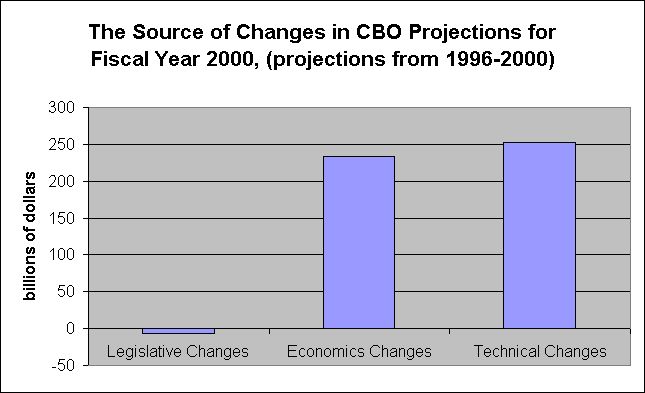April 29, 2011
There is an incredible amount of sanctimonious garbage going around Washington about the horrors of the deficit and the debt. In fact, there is so much nonsense that it would be impossible to ever run out of frequently repeated assertions to ridicule.
One assertion that has gotten insufficient derision is that Clinton and/or the Gingrich Congress (pick your “hero”) took the tough steps needed to balance the budget. Some of us are old enough to remember the 90s. That isn’t quite what happened.
If we go back in 1996, we see that the Congressional Budget Office (CBO) was still projecting a large deficit for the year 2000. In May of 1996 CBO projected that the deficit in 2000 would be $244 billion or 2.7 percent of GDP. It turned out that we actually ran a surplus in 2000 of $232 billion, or roughly 2.4 percent of GDP. This involves a shift from deficit to surplus of $476 billion or 5.1 percentage points of GDP. This would be equivalent to reducing the annual deficit by $750 billion in 2011.
The reason for picking 1996 as the year to look at projections is that the Clinton tax increases were already law, and therefore included in the baseline projections at that point. The same is true of most of the spending cuts demanded by the Gingrich Congress. Here’s CBO’s assessment of the changes that moved us from large projected deficits to a large budget surplus.

Source: Congressional Budget Office and authors’ calculations.
As the chart shows, all of the improvement in the budget between 1996 and 2000 was due to the fact that the economy performed much better than expected and that CBO had been overly pessimistic about trends in government spending and tax collections. The legislative changes added by Congress in this period actually went the wrong way. So, we did not actually move from large deficits to surpluses by tax increases and/or spending cuts, we did it through a strong economy and some good luck with the cost of government programs and tax collections. (The biggest part of this picture is that Alan Greenspan ignored the orthodoxy in the economics profession and allowed the unemployment rate to decline by almost 2 percentage points below the conventionally accepted estimates of the NAIRU*, but we won’t talk about that.)
*Non-Accelerating Inflation Rate of Unemployment






